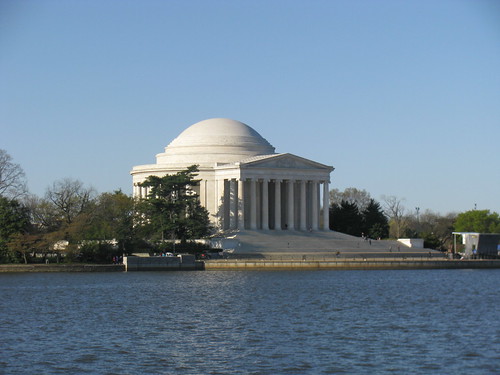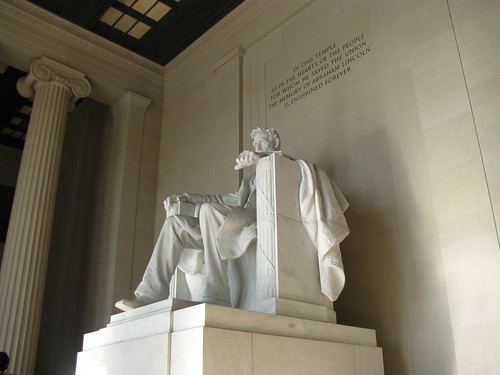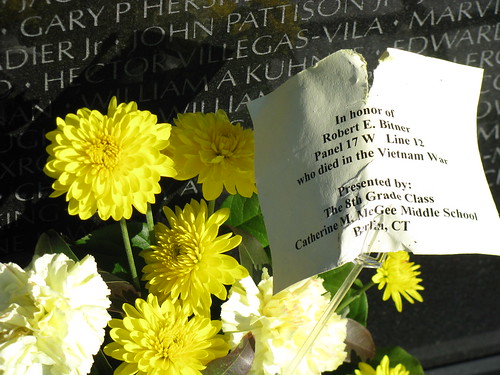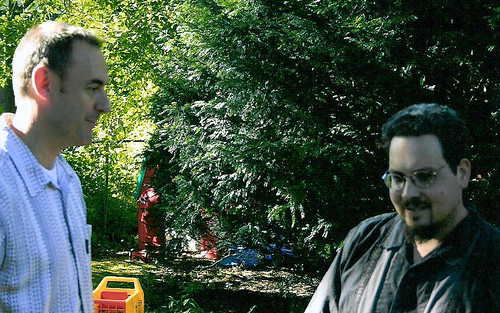|
|
Sunday, April 12th, 2009
We're back in New Jersey; the trip is over, we're back in one piece. This morning (Easter Morning)  dawned bright and clear (and a little chilly), and we took the metro in to DC for one more look at the mall. dawned bright and clear (and a little chilly), and we took the metro in to DC for one more look at the mall. We walked down to the tidal basin to look at cherry blossoms -- but yesterday's rain had brought most of them down. Walked around the perimeter of the basin and took some photos of the Jefferson Memorial (which I had pretty much forgotten even existed -- the sun shining on its marble dome took my breath away), and then up to the WWII Veterans' Memorial. I was kind of lost in thought as we walked through it and then along the reflecting pool to the Lincoln Memorial, though perhaps not the correct sort of thought -- I was wondering about what my response should be to these national memorials. I love to look at them and to linger over their lines and surfaces, but they don't  generally call to my mind the thing memorialized -- my response is æsthetic, not emotional or patriotic. generally call to my mind the thing memorialized -- my response is æsthetic, not emotional or patriotic. The Lincoln Memorial seized hold of my eye from all the way down the length of the reflecting pool and would not let go -- the way it was framed in the bright blue sky was just intensely beautiful; walking along that path, watching it get slowly bigger, then up the steps and into the room itself, pretty awe-inspiring. I had my closest to what I'm thinking of as an appropriate "memorial" response when Sylvia and I were standing inside, reading the text of Lincoln's second inaugural address.  (And also, perhaps, a little later when we were walking by the White House, and I found myself thinking of Nixon.) (And also, perhaps, a little later when we were walking by the White House, and I found myself thinking of Nixon.) Sylvia turns out to be pretty good at taking pictures of monuments; the one of the Jefferson Memorial above is hers, and so is this one looking up at Lincoln. Lots more pictures at the Family Album. The "inappropriate response" thing hit me the hardest, I think, at the Vietnam War Veterans' Memorial -- I was noticing and eating up the geometry of the thing, the sheen of the marble and the way it reflected the paths and the people and the flowers people had left, rather than reflecting on the memory of that war -- a war which is very close to being within my first-hand memory, though not quite there. Ellen got a beautiful photo of some chrysanthemums that a visiting middle school class had left in a soldier's memory:

posted evening of April 12th, 2009: 1 response
➳ More posts about the Family Album
|  |
Saturday, April 11th, 2009
Today, we went to the mall, and the museums. The weather was damp and grey; we spent all morning in the Museum of American History, then had lunch and split up. Ellen went to the Hirschhorn; Sylvia and I spent a couple of hours in the Museum of Natural History, then went to buy a scoop of ice cream and play cards together. (Sylvia is getting better at cassino, beat me at one game.)
The American History museum has a great deal of stuff to see. I really liked the "Art of the Letter" exhibit on illustration, and the science exhibit seemed like it had potential but by that time Sylvia was getting restless and we did not really spend enough time on it to get it. Julia Child's kitchen is great. At the Museum of Natural History, the skeletons and taxidermy are of course the main draw, but I was surprised to see what a nice small insectarium they have.
Now we're back at the hotel, and the sun has come back out. We're going to go take Pixie for her walk along the river. Hope everybody's holiday weekend is going well.
 Update: so, we walked not only down to the river but across a little pedestrian bridge we had not known about to Theodore Roosevelt Island, a little bit of wilderness in the middle of the Potomac; and then we walked up this big elevated pathway called Freedom Park. (Funny thing: when we got to the other end of the pathway we found the gate there was locked and we couldn't get out; we found our way out by circling around, and then we saw the sign for "Freedom Park" on the outside of the gate -- Sylvia said, "Funny it's called Freedom Park when we were locked in," which was the exact thing I had been thinking.) I'm enjoying finding our way around Arlington and D.C.
posted afternoon of April 11th, 2009: Respond
➳ More posts about Sylvia
|  |
|
I'm always taken with pictures of the aurora borealis. Hope I get to travel north sometime in the proper season for looking at it. My dad sent a link to some pictures of the Northern Lights over Yellowknife, Northwest Territories -- also there are some great pictures of frozen landscapes in Antarctica.

posted afternoon of April 11th, 2009: Respond
➳ More posts about Pretty Pictures
|  |
Friday, April 10th, 2009
We spent today on vacation! and a fine day it was. I went somewhere I have never been before, which is Georgetown. We set out pretty early and drove to visit Joyce and Jim, and had a nice time -- we haven't seen them in a long time. Then drove south to D.C. We're staying in Arlington, at the Palomar Hotel; it is a good place to stay and significantly cheaper than hotels across the river from here; and the best thing about it is they are "pet-friendly" -- so we are traveling with Lola and Pixie, which makes the whole trip a lot more fun and comfortable. We walked across the Francis Scott Key bridge to Georgetown, then down the canal path to Washington Harbour, then gradually back up to M Street; stopped in at a bookstore and browsed some titles -- I took a look at The Elegance of the Hedgehog, which I'd seen recommended at 3% (IIRC), and found it not to my liking; Sylvia picked up The Year of the Rat -- and then over to Pizzeria Paradisio for a very tasty meal. The long wait for a table gave Ellen and Sylvia a chance to go across the street to Georgetown Cupcakes to buy our dessert, which I'm looking forward to tasting. Tomorrow we will go into Washington proper and visit museums and landmarks. Also looking forward to taking Pixie for a long walk along the river.
posted evening of April 10th, 2009: 5 responses
|  |
Thursday, April 9th, 2009
The 14th, untitled poem in The Romantic Dogs is only three lines: I dreamt of frozen detectives in the great
refrigerator of Los Angeles
in the great refrigerator of Mexico City.
This introduces a series of five poems about "lost detectives" and "frozen detectives" and "crushed detectives" -- they moan desperately, they stare at their open palms, they are "intent on keeping their eyes open/ in the middle of the dream." These poems -- which are all about dreams -- make me think of Raymond Chandler; there is no stylistic similarity to speak of but I read "detectives" and "Los Angeles" and that is where my mind goes -- and they make me want to read Bolaño's novel The Savage Detectives to find out what his dream-detectives do when they are fleshed out into characters...The fourth poem in this sequence, "The Frozen Detectives," has another painting reference in it: I dreamt of detectives lost
In the convex mirror of the Arnolfinis:
Our generation, our perspectives,
Our models of Fear. I had to look this up -- turns out to be a painting I've seen many times and read a bit about at some point lost to my memory, "The Betrothal of the Arnolfinis," by Jan van Eyck:

An amazing, incredible picture; I don't have much to say about it here but that mirror seems like a fine place for dream-detectives to get lost. Anyway Sylvia was looking over my shoulder as I looked this up and she immediately recognized it as appearing in her book Dog's Night, which is the story of the dogs in all the paintings in an art gallery getting loose after hours one night -- it's a fine book and I recommend it if you are looking for a present for a young kid -- as I recall it's best suited for about a five- or six-year-old.
posted evening of April 9th, 2009: Respond
➳ More posts about The Romantic Dogs
|  |
Wednesday, April 8th, 2009
Michael Bérubé has a long post today about His Dark Materials and a few other things (thanks for pointing it out, Levi) -- it is a bit dense but as near as I can tell, he means to defend The Amber Spyglass against critics who think it is the weakest book in the series because it is too preachy, and simultaneously to point out a weakness in the series -- that it is written on too grand a scale -- and to talk about some other fantasy series, like LOTR and C.S. Lewis' science fiction books, in this context. I'm grateful to Dr. Bérubé for what he says about the world of the dead scene in The Amber Spyglass -- I had been having some cognitive dissonance over the last few weeks from failing to acknowledge the lameness of the Lyra's-hair bomb plot device. I had gotten up on a horse about the great beauty of the descent into the world of the dead, but was having trouble riding it. That said I don't think the idea that the harpies want to hear true stories of the world of the living is as bad as Bérubé does; I kind of like it, and I didn't attach a huge amount of importance to its role in the plot as I was reading. I'm tentatively working on a response to people who complain about the preachiness of His Dark Materials, and which I think would also work as a response to Bérubé's complaint about Tolkien's stilted language -- making the argument against the church seems to be a huge part of Pullman's goal in writing these books. I did not (generally) find that the pedantry detracted from the story; but he is not only telling a story. Saying that the pedantry detracts from the story is like, well, like saying that Tolkien's archæic usages detract from his story -- I think Tolkien is at least as interested in creating a world where these usages will work, as he is in telling a story about a hobbit's quest. But this needs a fair amount of work before it will actually be an argument of any sort.
 Some great discussion in the comments thread over there as well -- particularly from Kathleen, Alan Jacobs, Rich Puchalsky. I'm reluctant to enter into it myself because I like the books so much -- the tone of the comment thread seems to be focusing on the faults of the books, if I join the discussion mooning about how great the trilogy is, I am just going to look silly and thoughtless -- and yet I find my response to the criticisms is mostly just along the lines of "yeah that's true, but still it is a wonderful read..."
posted evening of April 8th, 2009: Respond
➳ More posts about His Dark Materials
|  |
Tuesday, April 7th, 2009
Bolaño's poem "El Mono Exterior", "The Monkey Outside", starts out by asking, "Do you remember the Triumph of Alexander the Great, by Gustave Moreau?" -- I did not -- never seen it, I'm pretty sure, and did not recognize the painter's name. Here is an image of it: The poem is difficult to make much sense of, either by itself or in the context of the painting, but it's an attractive jumble of images. He seems to be addressing somebody who is blasé about the purported power of this painting (I can't see it; but then I am just looking at a little jpg of it), who "walked like a tireless ape among the gods,/ For you knew -- or maybe not -- that the Triumph was unfurling/ its weapons inside Plato's cavern: images,/ shadows without substance, sovereignty of emptiness." I'm not sure if he's reproaching the person he's talking to -- and indeed he might be talking to himself. The poem is difficult to make much sense of, either by itself or in the context of the painting, but it's an attractive jumble of images. He seems to be addressing somebody who is blasé about the purported power of this painting (I can't see it; but then I am just looking at a little jpg of it), who "walked like a tireless ape among the gods,/ For you knew -- or maybe not -- that the Triumph was unfurling/ its weapons inside Plato's cavern: images,/ shadows without substance, sovereignty of emptiness." I'm not sure if he's reproaching the person he's talking to -- and indeed he might be talking to himself.
 Update: This poetry course from Aula de Poesia de Barcelona (PDF format, Spanish language) has some questions for writing about "El Mono Exterior", on page 5. Also featured: Borges, José Jorge Letria, Juan López de Ael, Claudia Groesman. (Why is the school's name not spelled "Aula de PoesÃa"? Is this a Catalán thing?)
Late Update: Bolaño also references Moreau in the first section of 2666.
posted evening of April 7th, 2009: Respond
➳ More posts about Roberto Bolaño
|  |
|
Saramago posts today about how he came by his writing style. Interesting in the context of Edmond's calling it "Baroque":
This, what people call my style, arises from a great admiration for the language which was spoken in Portugal in the 16th and 17th Centuries. Let us look at the sermons of Father António Vieira and we'll see that in everything he wrote, there is a language filled with flavor and rhythm, as if this were not exterior to the language but rather something intrinsic.We do not know how people spoke in this epoch, but we know how they wrote. Language back then was an uninterrupted flow. Admitting that we could compare it to a river, we feel that it's like a great mass of water that slips along with weight, with splendor, with rhythm, including when at times, its course is interrupted by cataracts. Some days of vacation have arrived, a fine time for wading deep into these waters, into this language written by Father Vieira. I'm not advising anyone to do anything, just saying that I'm going to go swimming in the greatest prose and, for this reason, will be gone for a few days. Would anyone like to come along?
posted evening of April 7th, 2009: 1 response
➳ More posts about Saramago's Notebook
|  |
|
 William Wordsworth is just turning 239 years old today -- he is 200 years and a few months older than I. (In the picture at left he is 28, ten years my junior.) William Wordsworth is just turning 239 years old today -- he is 200 years and a few months older than I. (In the picture at left he is 28, ten years my junior.)
Wordsworth is a poet whom I'm always thinking I ought to be more familiar with than I am. I know a couple of his poems but I don't really have any clear sense of his persona as an author -- know him better by way of his influence on some of my favorite writers and thinkers. (And come to think of it, here I am thinking more of "the English romantics" than of Wordsworth individually.) And O, ye Fountains,
Meadows, Hills, and Groves,
Forebode not any severing of our loves!
Yet in my heart of hearts I feel your might;
I only have relinquished one delight
To live beneath your more habitual sway.
I love the Brooks which down their channels fret,
Even more than when I tripped lightly as they;
The innocent brightness of a new-born Day
Is lovely yet;
The Clouds that gather round the setting sun
Do take a sober colouring from an eye
That hath kept watch o'er man's mortality;
Another race hath been, and other palms are won.
Thanks to the human heart by which we live,
Thanks to its tenderness, its joys, and fears,
To me the meanest flower that blows can give
Thoughts that do often lie too deep for tears. -- from "Intimations Of Immortality From Recollections Of Early Childhood"
posted morning of April 7th, 2009: Respond
➳ More posts about Birthdays
|  |
Monday, April 6th, 2009
In this chapter there are two passages that strike me as very cinematic -- I can see them playing out animated on the screen. (Granted Tolkien was writing before the advent of anime, so he probably did not have that style in mind; but I think it is suited very well to his words.)
She lifted up her hand and from the ring she wore there issued a great light that illuminated her alone and left all else dark. She stood before Frodo seeming now tall beyond measurement, and beautiful beyond enduring, terrible and worshipful. Then she let her hand fall, and the light faded, and suddenly she laughed again, and lo! she was shrunken: a slender elf-woman, clad in simple white, whose gentle voice was soft and sad. This is just great. I can see her holding the ring up, it shining down on her, her transformation into something fearful -- it could be lifted right out of Howl's Moving Castle. Then there was a pause, and many swift scenes followed that Frodo in some way knew to be parts of a great history in which he had become involved. The mist cleared and he saw a sight which he had never seen before but knew at once: the sea. Darkness fell. The sea rose and raged in a great storm. Then he saw against the Sun, sinking blood-red into a wrack of clouds, the black outline of a tall ship with torn sails riding up out of the West. Then a wide river flowing through a populous city. Then a white fortress with seven towers. And then again a ship with black sails, but now it was morning again, and water rippled with the light, and a banner bearing the emblem of a white tree shown in the sun. A smoke as of a fire and a battle arose, and again the sun went down in a burning red that faded into a grey mist; and into the mist a grey ship passed away, twinkling with lights. It vanished, and Frodo sighed and prepared to draw away. I'm not as crazy about this. I think it could work really well on screen; but in the text something seems wrong with it. Those images are flashing by quickly, my gut reaction is that Frodo cannot be processing them as quickly as the narrator is telling us, and it makes it seem like a cheat. In the movie you would see all those images but you would not be able to narrate them in real-time like this -- you would have to assemble the narrative after the images had passed -- which is what I think Frodo would need to do, and by serving it up to us like this the narrator is taking us away from the story. Not sure this makes any sense, I'm trying to convey my impression here. Magic and prophesy are another element that LOTR has in common with Narnia and His Dark Materials -- maybe I did not mention this last time because it seemed obvious, magic and prophesy are sort of defining features of the fantasy genre -- but I think it would be worth a post at some point examining how magic and prophesy in the story, and the characters' response to them, affect my reading experience. I don't read very much fantasy, so I am noticing this part of the reading as something unusual.
posted evening of April 6th, 2009: 3 responses
➳ More posts about The Lord of the Rings
| Previous posts
Archives  | |
|
Drop me a line! or, sign my Guestbook.
•
Check out Ellen's writing at Patch.com.
| |

